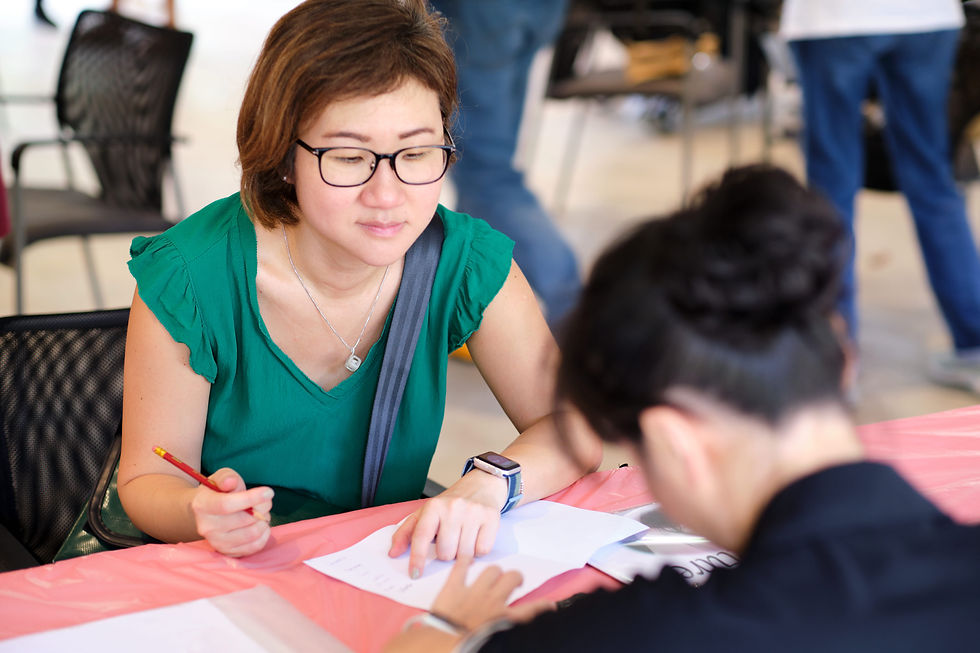WALKING BY MY SIDE
- contact01436
- Jan 12, 2022
- 3 min read
Updated: Feb 25, 2022

A Parallel Learning Journey
“I choose to trust her,” said Azura when asked why she saw Phyllis as a significant person in her life. Perhaps it was Phyllis’ unwavering support during Azura’s challenging times in life that bonded them and led the Little Sister to put trust in her Big Sister.At the age of 21, Azura took on the daunting role of becoming her family’s sole breadwinner. During this time, Phyllis helped Azura realise that she could fulfil her dreams even while providing for her family. Azura’s start at work was challenging as she faced doubts on many fronts, especially if she was capable of doing frontline work. However, she eventually proved herself and even received many compliments from customers.
Today, Azura works at a call centre and has recently been awarded a Certificate of Best Performance, an achievement that the Beautiful People family is very proud of.
Another difficult period was when Azura had to seek treatment for a leg infection. Phyllis became a pillar of support as they made visits to different doctors to get a diagnosis for her condition and sought ways to raise funds for treatment. There were trying moments filled with disappointments, but also joy and relief. Most importantly, journeying through these shared experiences also brought the pair closer together.
So what does it take for a mentoring relationship to blossom?
Both Phyllis and Azura feel that giving each other space helps. Sometimes it may take a while for the Little Sister to open up to the Big Sister. Phyllis has learned to pace with Azura, she says, “When she is not ready to work on her situation, I stand next to her, letting her know I will walk with her when she is ready to walk”. Phyllis believes that love and sincerity will move a person over time.
For Azura, having a Big Sister whom she feels does not judge her has been important for their journey. Azura appreciates that Phyllis takes a forward-looking approach and never asked about her past or why she was in the rehabilitation residence. A Big Sister is different from professional care staff, who would be taking notes during their conversations, which made her feel that she could not quite share as freely.
Azura is also grateful for the guidance and support of other Big Sisters whom she considers family to her. Going through the ‘My Beautiful Life’ programme has helped her learn useful life skills such as resume writing, and to connect to a community of Big Sisters who have exposed her to more possibilities in life.
Azura appreciates that Big Sisters help point her to options and possible scenarios rather than provide answers to her situations or problems that she faces. This forces her to think through things and hone her decision-making acumen in the process. Phyllis shared that this means learning to respect the decision of the Little Sister regardless of what she chooses. From their experience journeying together, the pair has some advice to share. For a start, a relationship can go far only if both Big and Little Sisters want to embark on the journey together. Azura feels that if both are willing to make the mentoring journey work, it does not matter whom the Little Sister is paired with.
From a Big Sister’s perspective, Phyllis feels that one must set realistic expectations with the Little Sister. Being committed is important – if a Big Sister promises something, she must honour it. Big Sisters are role models to Little Sisters, and this is also a way of teaching them about responsibility.
Azura feels that mutual respect for each other is key to making the relationship work. She advises Big Sisters to balance between indulging in Little Sisters and build some discipline in Little Sisters. She cautioned against giving Little Sisters money as this may create a relationship that is hinged upon Big Sisters’ willingness to provide for the Little Sister. Phyllis feels that as the learning journey is a parallel one, Big Sisters should also actively share with Little Sisters their ups and downs in life. Little Sisters can celebrate their Big Sisters’ happy moments and even provide a shoulder to cry on during sad moments. For Phyllis, her walk with Azura through challenging life transitions gives her strength whenever she feels down.
To keep the relationship going, Phyllis suggests participating together in common interest activities such as painting, sports or dancing. Doing community work is a dream that Phyllis and Azura share. They have been on community projects to orphanages in Batam in Indonesia and Maesot in Thailand where they taught English to the children. This has been a meaningful way for them to bond. Going forward, Phyllis would like to involve Azura’s mum more in their activities together.
2013







Comments